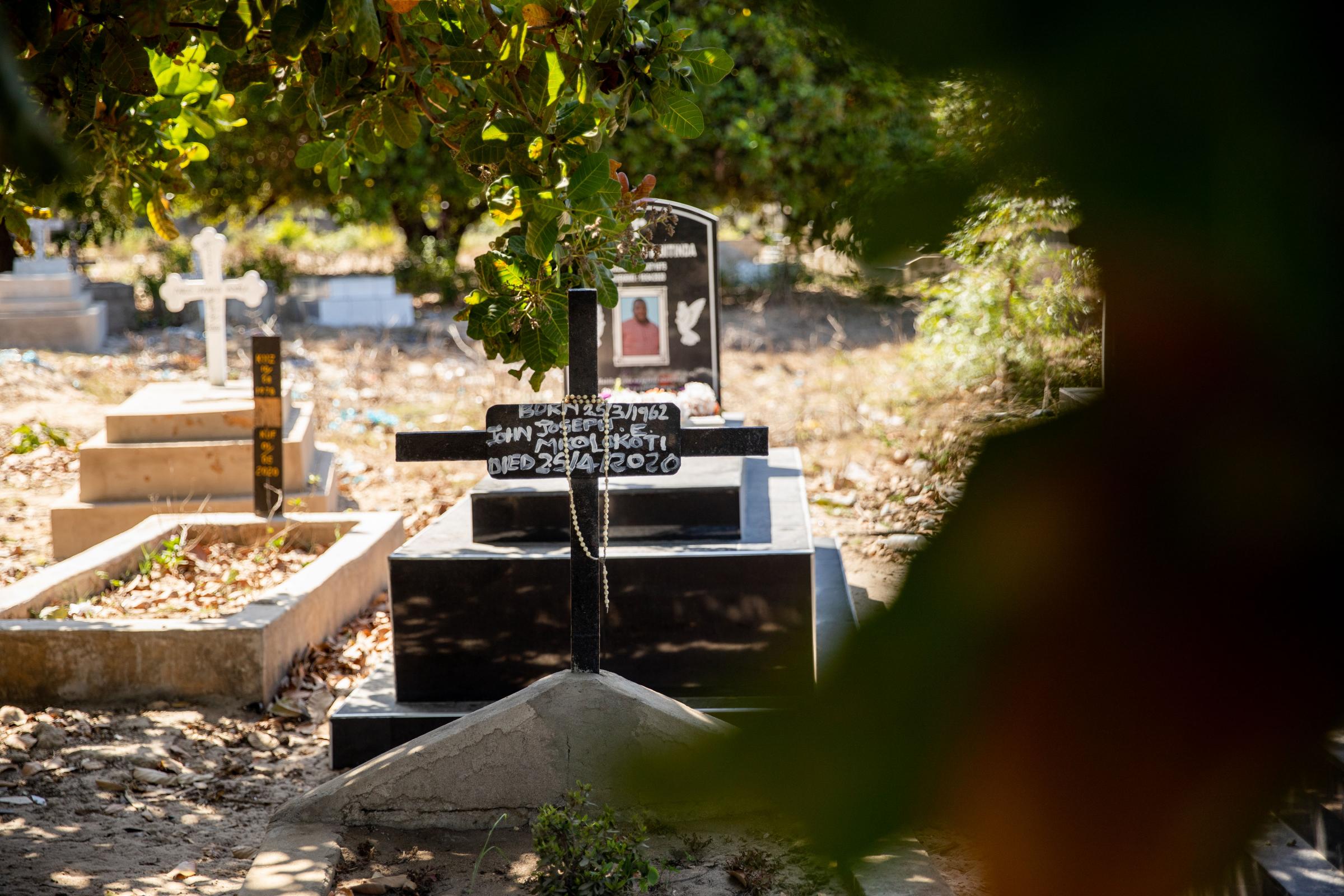
Graveyards at the Kondo cemetery just outside Dar es Salaam, Tanzania on 27 October 2001.
Videos of night burials have been circulating on social media in Tanzania causing some to call into question the government's approach to the coronavirus pandemic.
Kondo is one of the cemetery’s were bodies were dumped.
The footage shows the funerals taking place under tight security with people wearing personal protective equipment and very few mourners in attendance.
Opposition politicians and activists believe it may be part of cover-up by the authorities who have not been releasing regular updates on coronavirus.
CREDIT: Samantha Reinders for The Wall Street Journal
SLUG: Tanzania
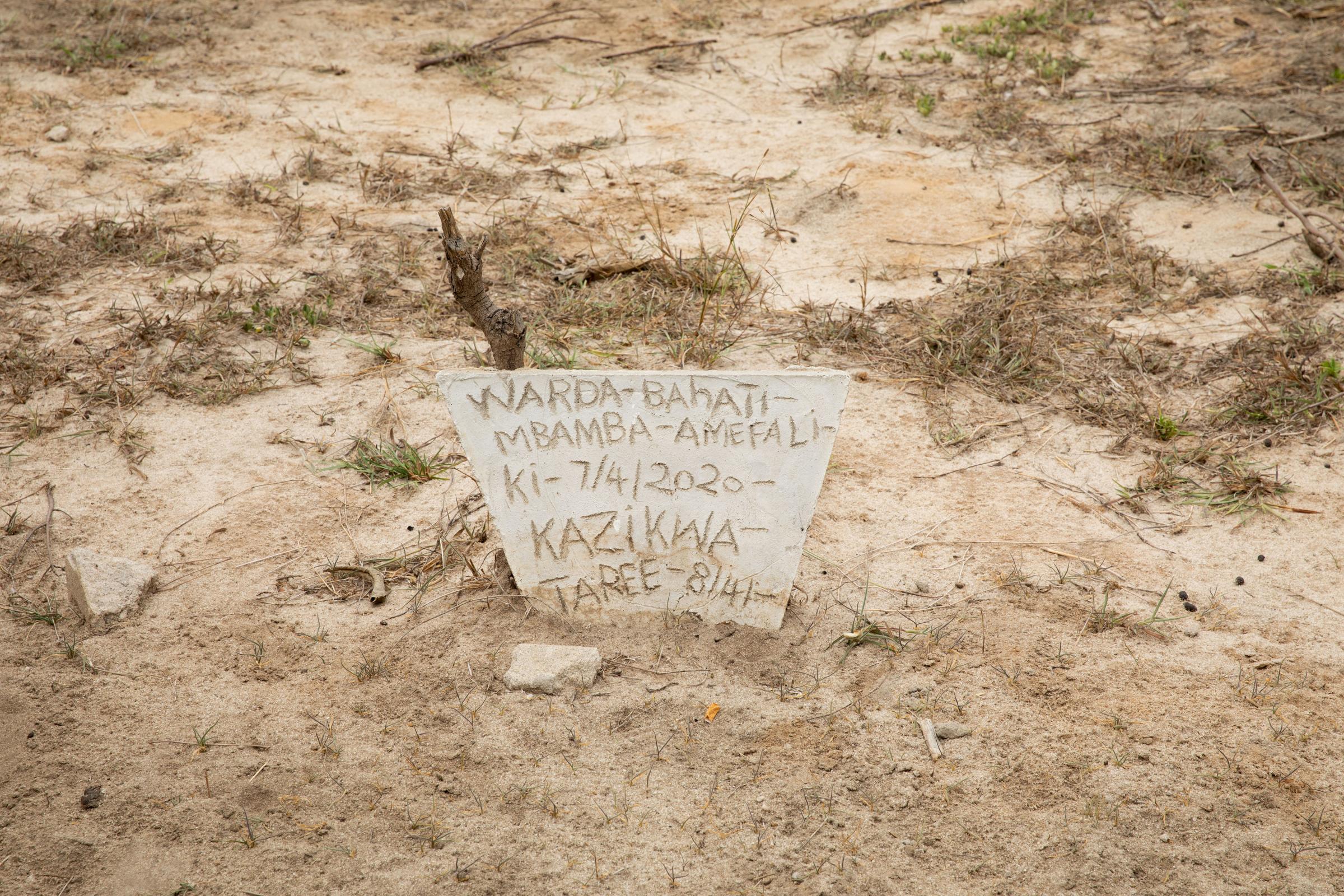
Newly dug graves in the Bungu ward of Dar es Salaam, Tanzania on 26 October 2021.
Videos of night burials were circulated on social media in Tanzania causing some to call into question the government's approach to the coronavirus pandemic.
The footage shows funerals taking place under tight security with people wearing personal protective equipment and very few mourners in attendance.
Opposition politicians and activists believe it may be part of cover-up by the authorities who have not been releasing regular updates on coronavirus.
Unlike other countries, Tanzania has not opted for strict lockdown measures although mass gatherings at funerals, like weddings, have been banned.
CREDIT: Samantha Reinders for The Wall Street Journal
SLUG: Tanzania
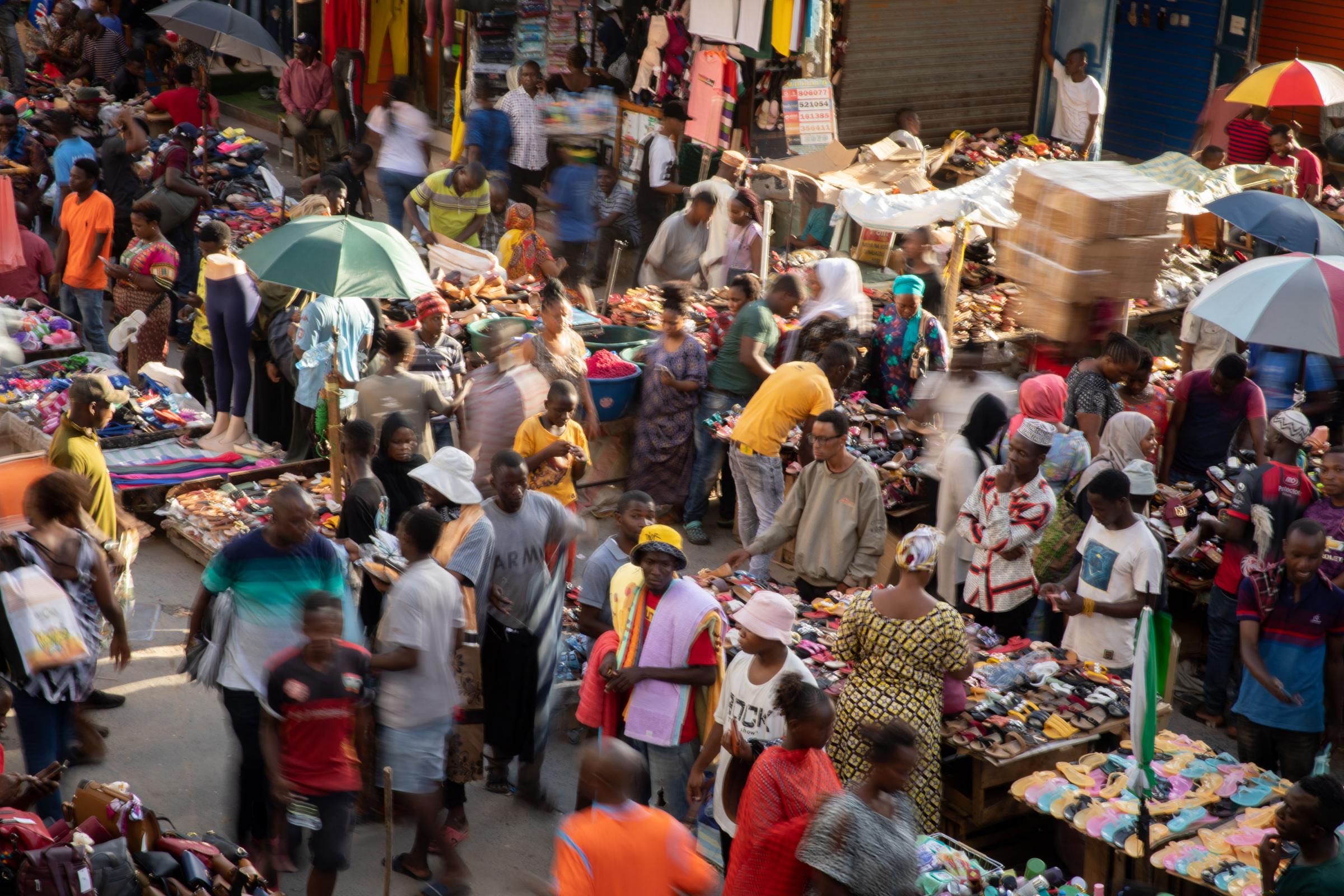
Kariakoo Market in central Dar es Salaam, Tanzania on 28 October 2001.
Crowds of traders, food vendors, and visitors buy, sell, gossip, eat, laugh, pickpocket, bargain and hang out in huge numbers without a mask in sight. Kariakoo is the nerve centre of all manner of commerce in Dar es Salaam.
The main market building whose existence dates back to the colonial days was gutted by fire in mid-2021. Despite this vending continues unabated attracting more people than ever.
CREDIT: Samantha Reinders for The Wall Street Journal
SLUG: Tanzania
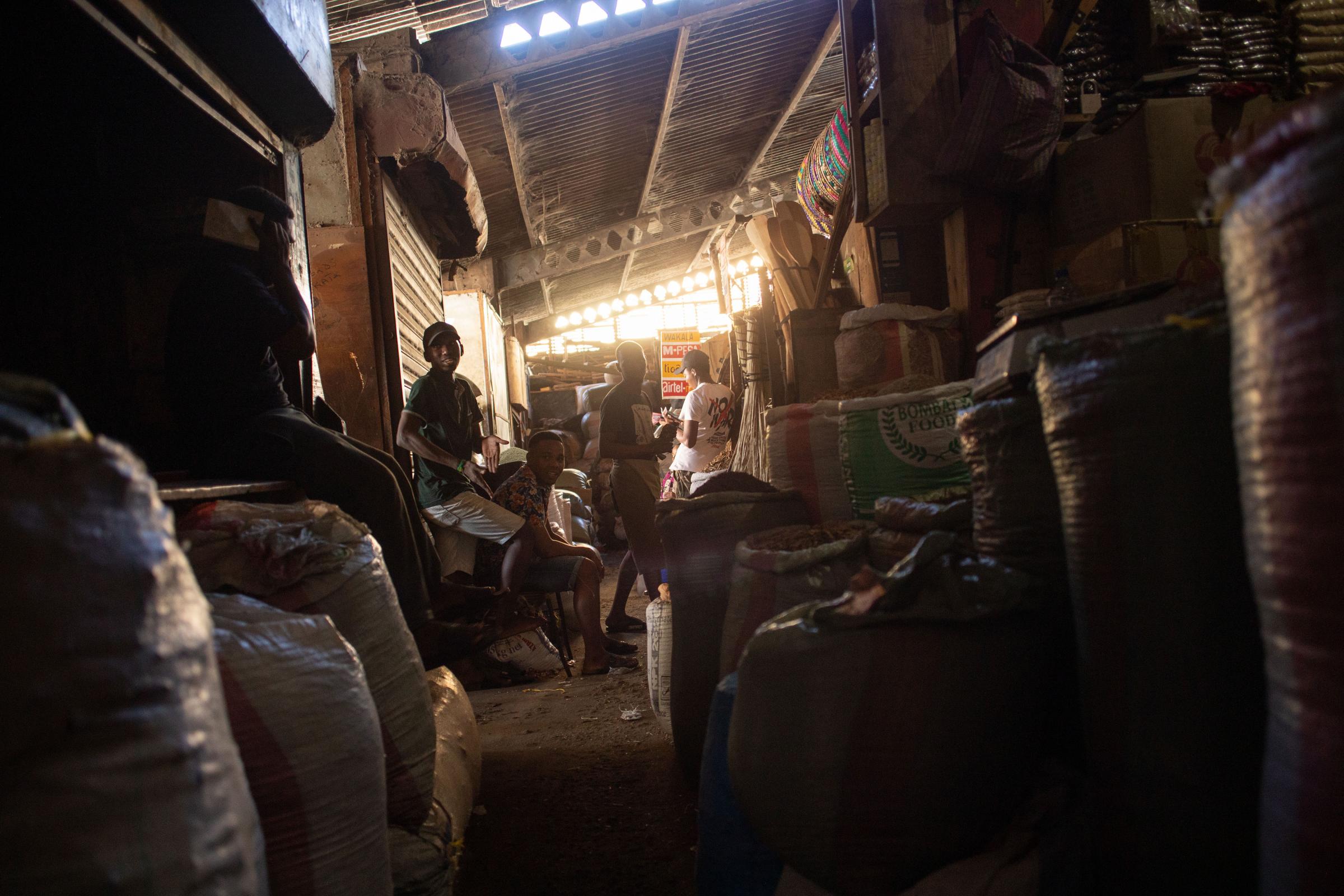
Daily life unfolds in a section of Kariakoo Market on 25 October 2021.
The market - whose existence dates back to the colonial days - is found in the heart of Dar es Salaam and serves millions of people in East and Central Africa on a daily basis. It is a constant hustle and bustle.
Covid has changed little for this market - social distancing here is not possible and masks are not worn.
CREDIT: Samantha Reinders for The Wall Street Journal
SLUG: Tanzania
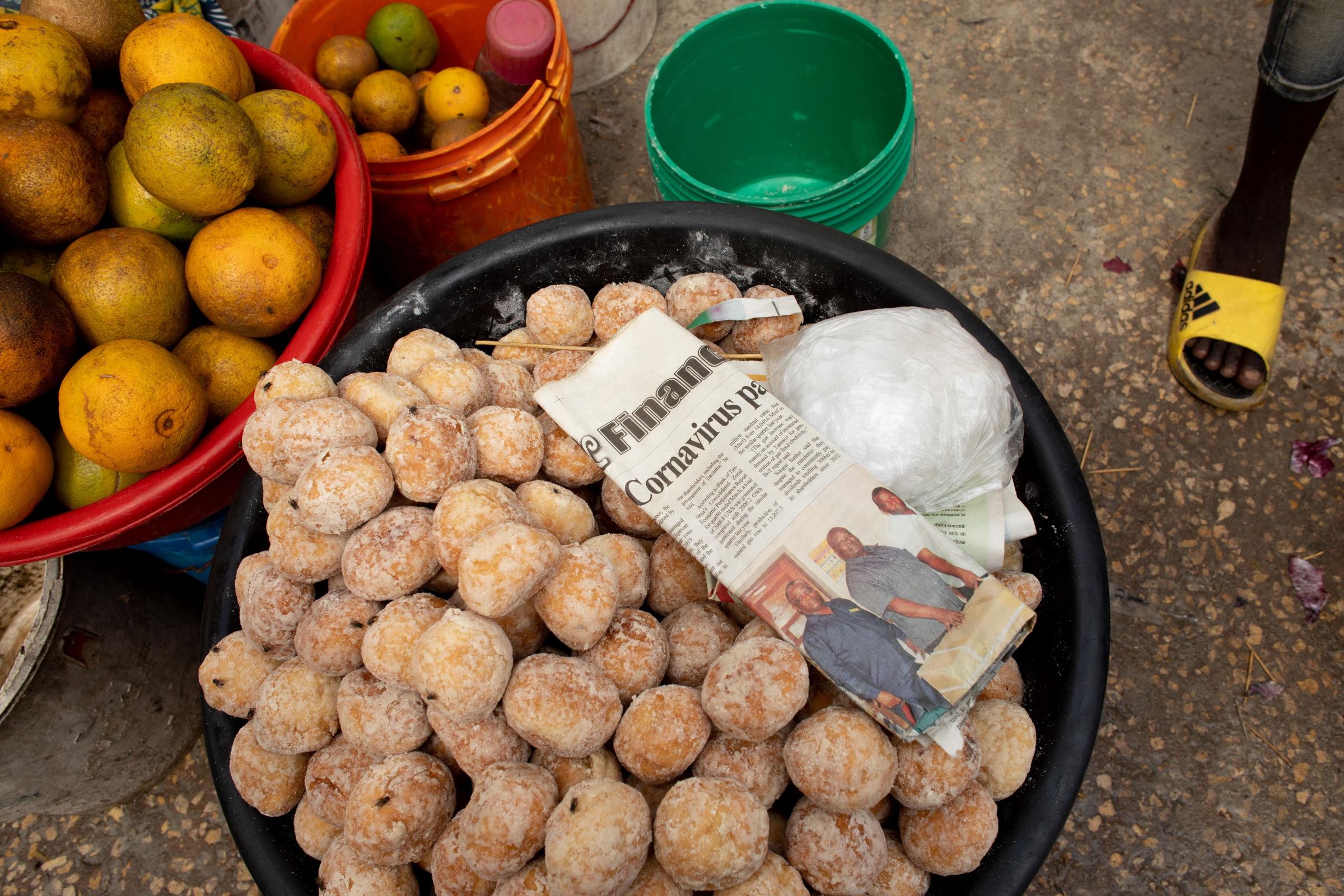
Newspapers with Covid-19 headlines are used to wrap fresh dough balls at Dar es Salaam
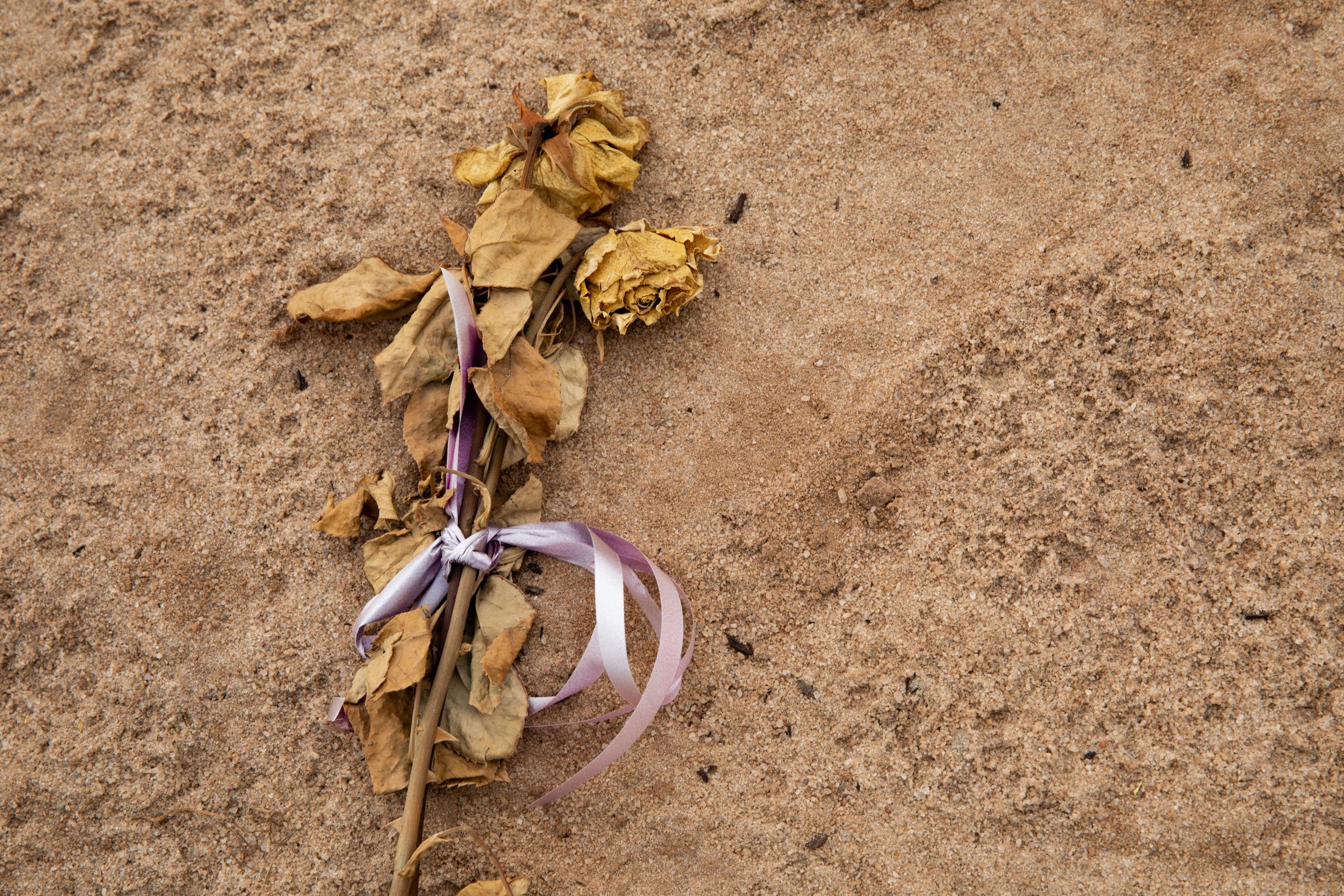
Newly dug graves in the Bungu ward of Dar es Salaam, Tanzania on 26 October 2021.
Videos of night burials were circulated on social media in Tanzania causing some to call into question the government's approach to the coronavirus pandemic.
The footage shows funerals taking place under tight security with people wearing personal protective equipment and very few mourners in attendance.
Opposition politicians and activists believe it may be part of cover-up by the authorities who have not been releasing regular updates on coronavirus.
Unlike other countries, Tanzania has not opted for strict lockdown measures although mass gatherings at funerals, like weddings, have been banned.
CREDIT: Samantha Reinders for The Wall Street Journal
SLUG: Tanzania
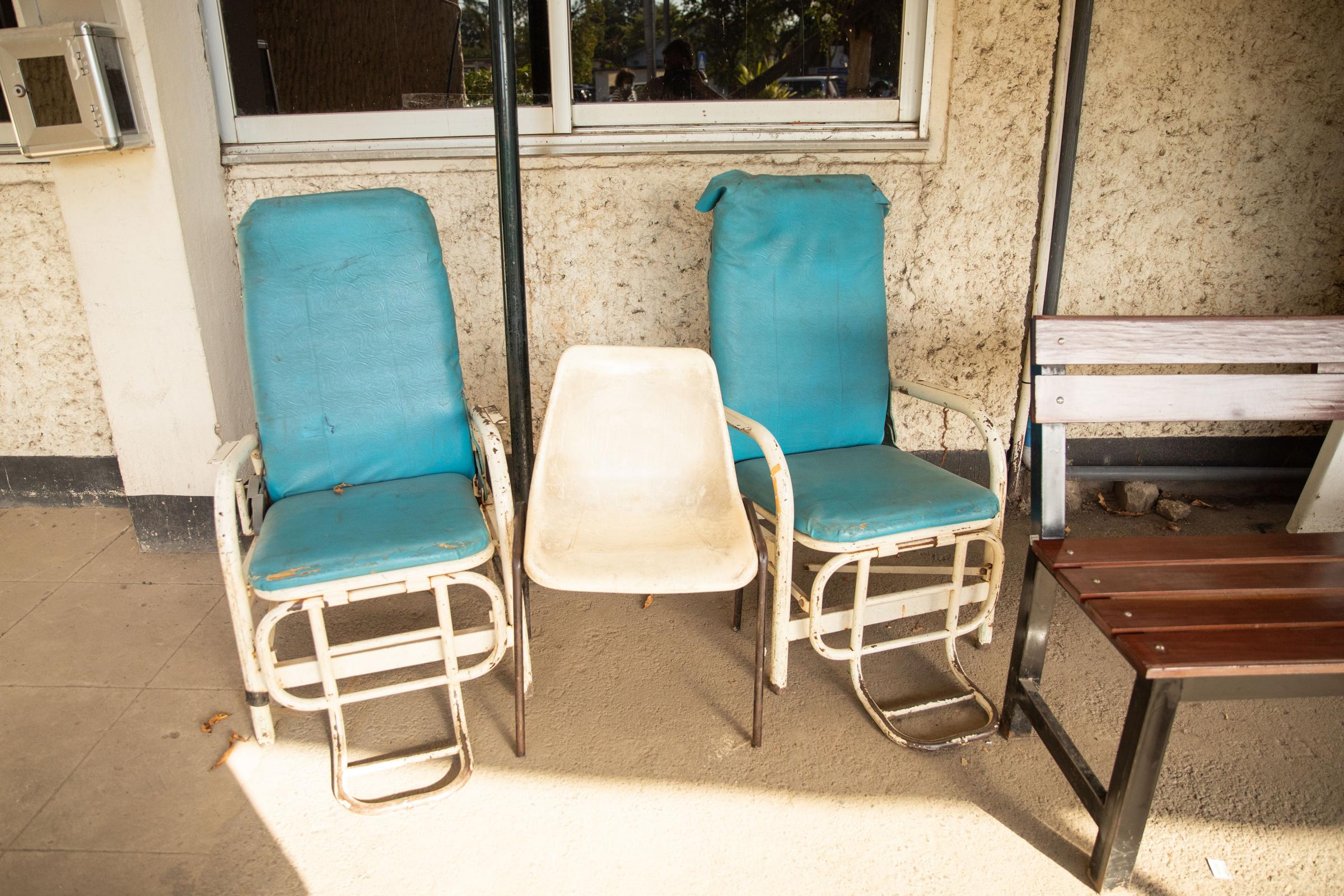
The area where patients get their PCR tests done at Muhimbili National Hospital in central Dar es Salaam, Tanzania on 27 October 2021.
Muhimbili National Hospital (MNH) is a National Referral Hospital, Research Center and University teaching Hospital with 1500 bed capacity and attending 2000 outpatients per day.
It has 2800 employees which includes doctors, nurses, pharmacists and other supporting staff.
CREDIT: Samantha Reinders for The Wall Street Journal
SLUG: Tanzania
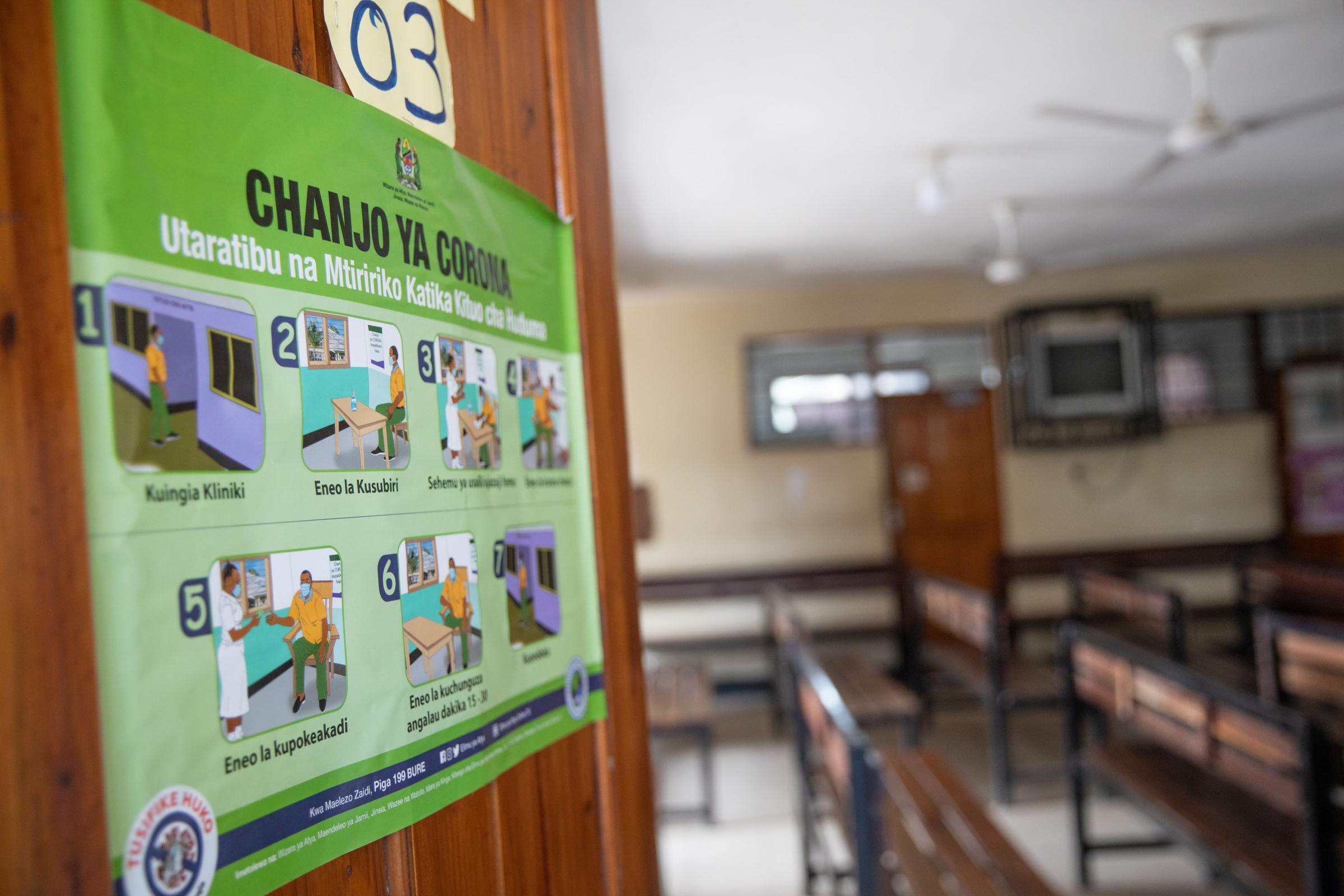
The vaccination room at the Tandale Hospital in the Kinondoni municipality of Dar Es Salaam, Tanzania on 27 October 2021.
The East African country, which largely eschewed mask-wearing and social distancing, has joined the World Health Organization’s COVAX initiative.
As vaccines become widely available, a huge number of Tanzanians are still undecided about getting vaccinated because of a complex web of moral, medical and political convictions.
President Samia Suluhu Hassan, who publicly took the Johnson & Johnson shot during a campaign kick-off in July 2021 that was intended to vaccinate at least 60% of the nation’s 58 million people has called for more awareness building.
CREDIT: Samantha Reinders for The Wall Street Journal
SLUG: Tanzania
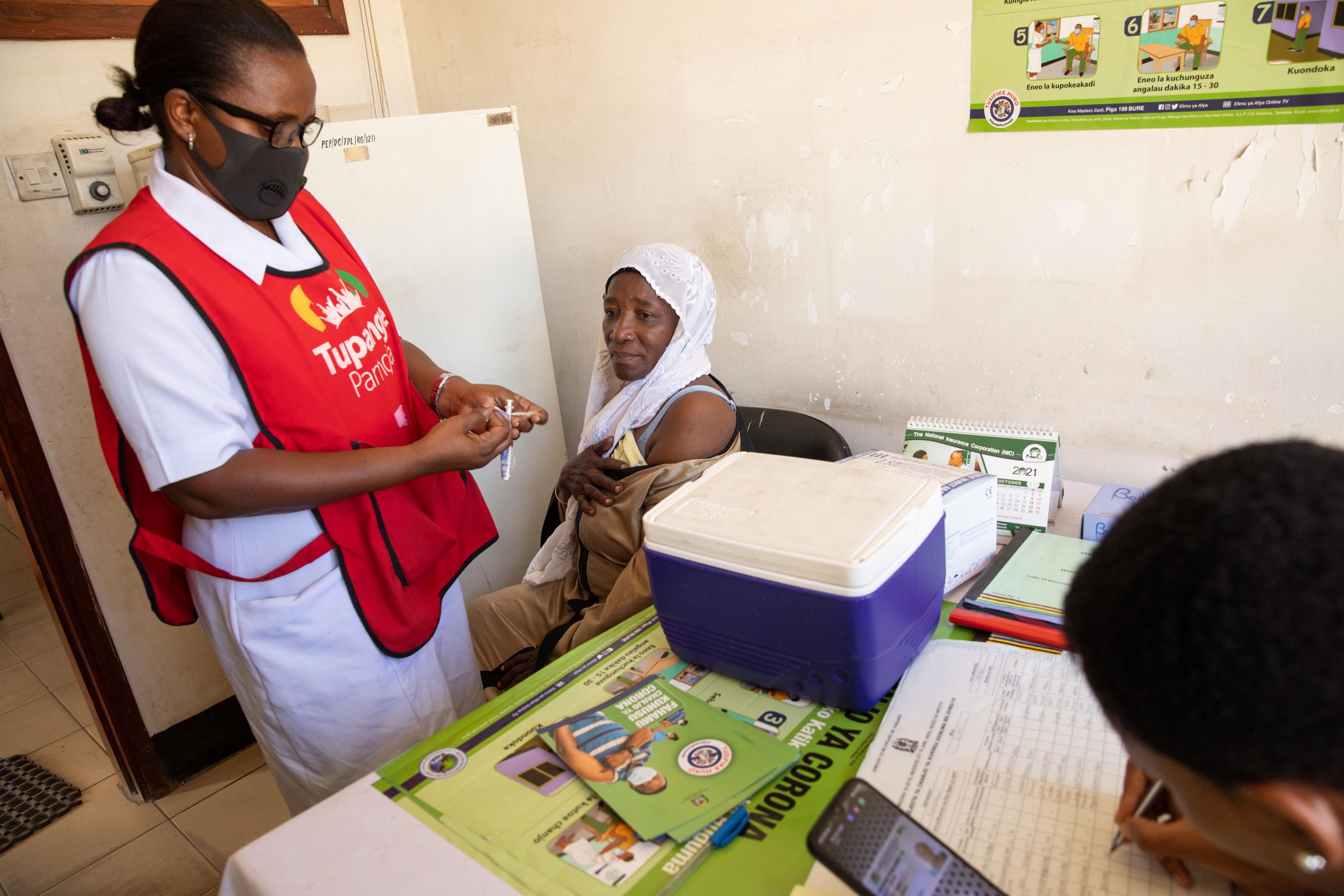
Mwatime Hassan Kimwaga gets her dose of a Sinopharm vaccine from Assistant Nurse Offficer Davineth Lameck at the Tandale Hospital in the Kinondoni municipality of Dar Es Salaam, Tanzania on 27 October 2021.
This was the 7th vaccine that was given at that hospital for the day.
The East African country, which largely eschewed mask-wearing and social distancing, has joined the World Health Organization’s COVAX initiative.
As vaccines become widely available, a huge number of Tanzanians are still undecided about getting vaccinated because of a complex web of moral, medical and political convictions.
President Samia Suluhu Hassan, who publicly took the Johnson & Johnson shot during a campaign kick-off in July 2021 that was intended to vaccinate at least 60% of the nation’s 58 million people has called for more awareness building.
CREDIT: Samantha Reinders for The Wall Street Journal
SLUG: Tanzania
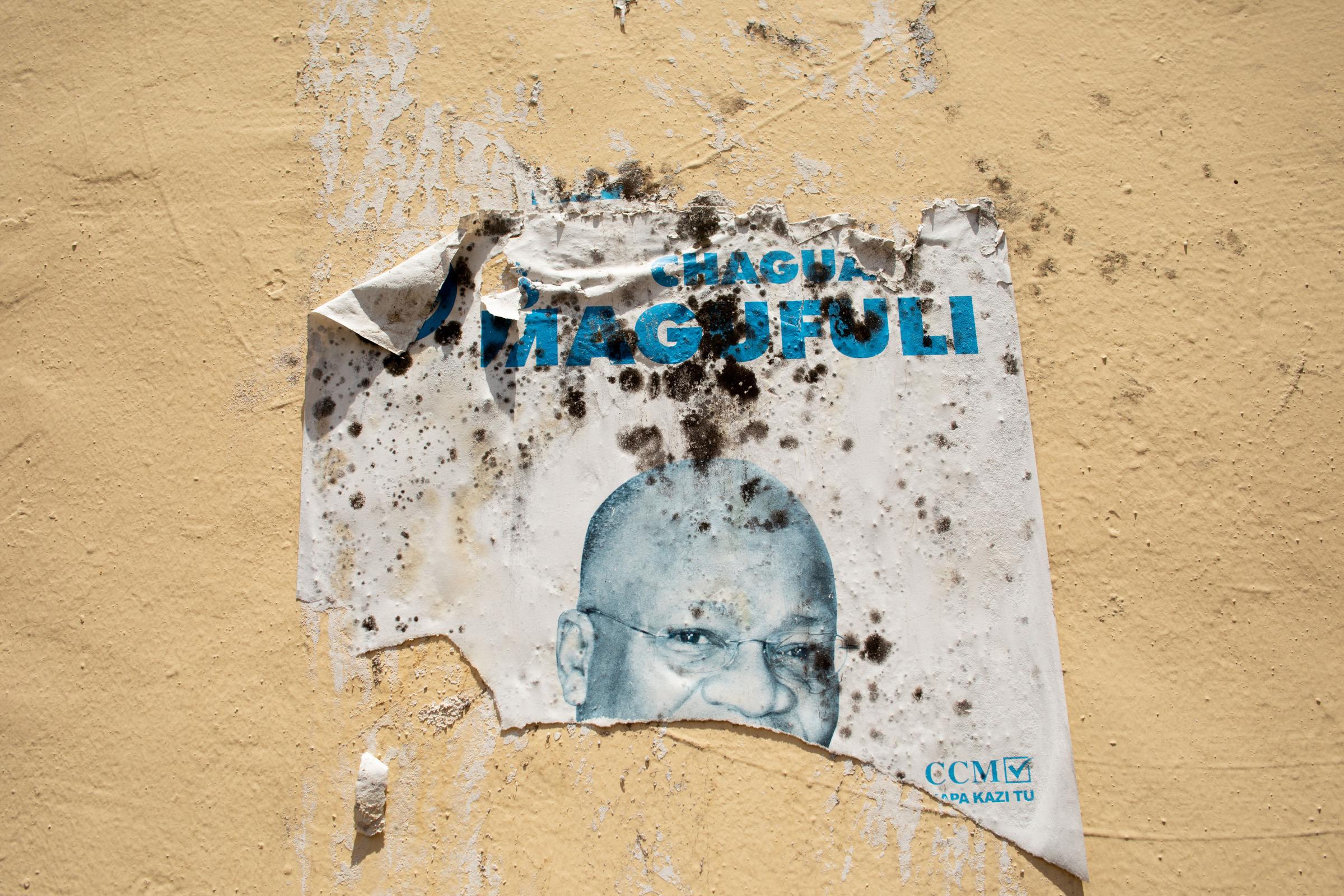
Worn and torn posters of ex-president John Magufuli, who died in March 2021, adorn walls across the city of Dar Es Salaam. This one was taken in the city center on 28 October 2021.
John Magufuli was a leader who was simultaneously revered and loathed. For many, the pandemic is almost certain to be one of the most defining issues of Magufuli’s presidency though.
As the coronavirus took hold across the globe in 2020, Magufuli downplayed its severity and pointedly rejected the idea of locking his country down. Tanzania officially stopped reporting case numbers in April 2020, remaining open to travellers and without restrictions on social gatherings.
Magufuli also made a number of headline-grabbing statements, including that the virus was a Western hoax and could not survive “in Christ’s body”. He mocked mask-wearers and told Tanzanians to treat flu-like symptoms with steam inhalation and other traditional herbal medicines.
CREDIT: Samantha Reinders for The Wall Street Journal
SLUG: Tanzania
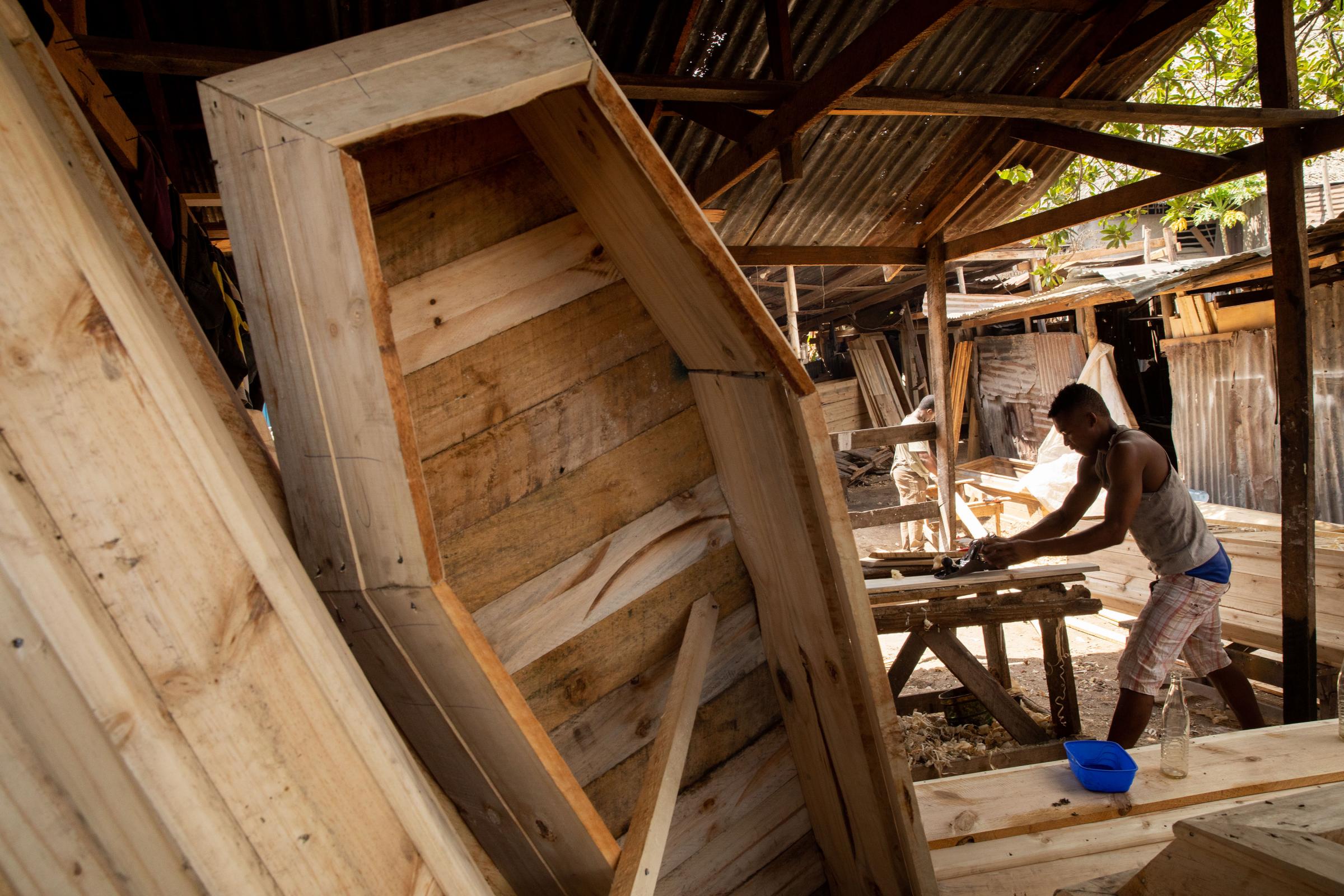
China Libabu makes a coffin in the Manzese district of Dar Es Salaam, Tanzania on 27 October 2021.
The coffin making industry flourishes in this district and business, according to those who work there, has been booming. Despite Covid-19 officially not being reported from April 2020 their business peaked several times between then and now - replicating what was probably the country’s several waves of the pandemic.
Kennedy Morris, who owns one of the coffin shops, explained that in pre-pandemic days he would sell 2-3 coffins a day. In 2020 and 2021 there were times when he sold up to 7 or 8 a day. (They are currently back to 2 or 3 a day)
CREDIT: Samantha Reinders for The Wall Street Journal
SLUG: Tanzania
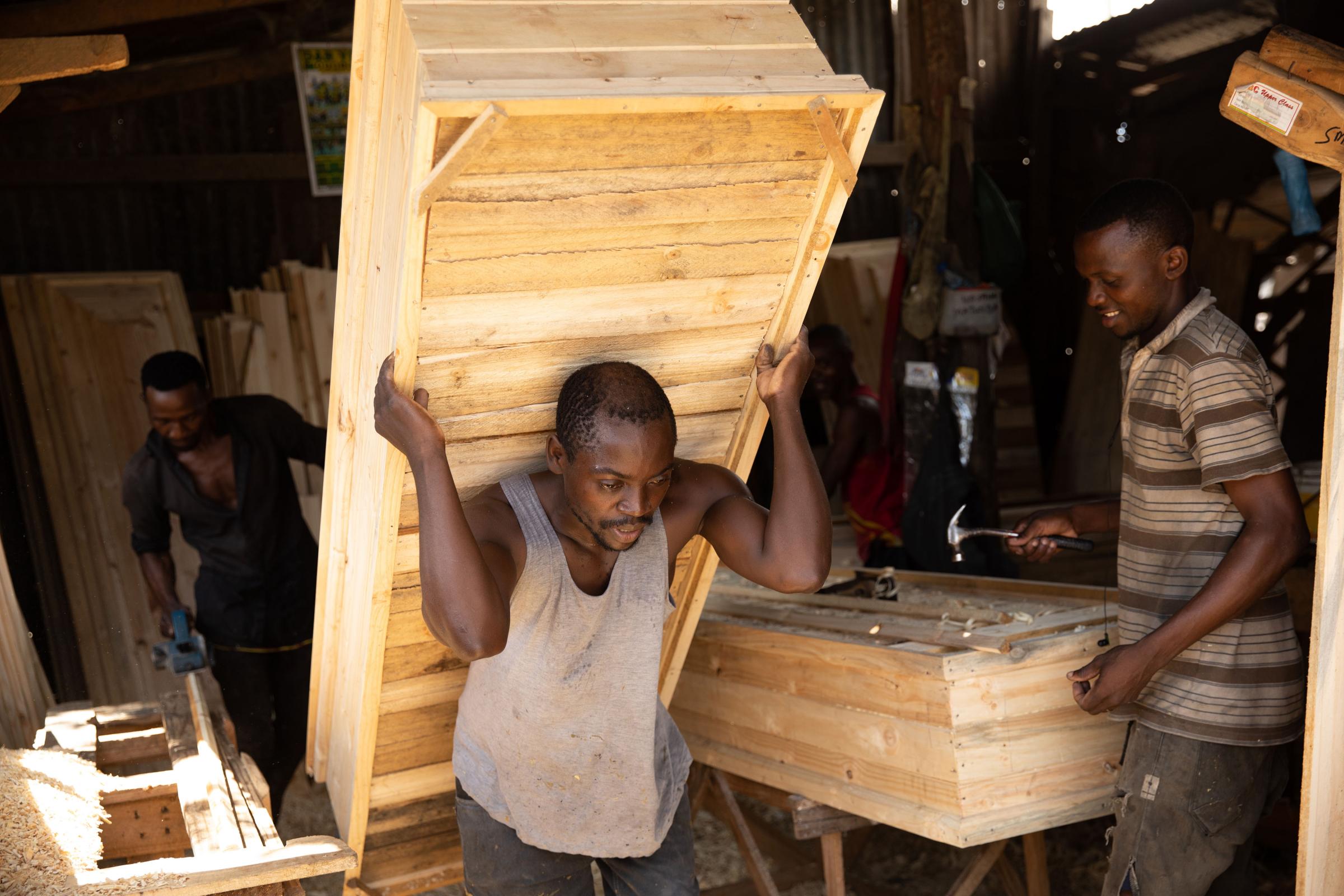
Coffins being made in the Manzese district of Dar Es Salaam, Tanzania on 27 October 2021.
The coffin making industry flourishes in this district and business, according to those who work there, has been booming. Despite Covid-19 officially not being reported from April 2020 their business peaked several times between then and now - replicating what was probably the country’s several waves of the pandemic.
Kennedy Morris, who owns one of the coffin shops, explained that in pre-pandemic days he would sell 2-3 coffins a day. In 2020 and 2021 there were times when he sold up to 7 or 8 a day. (They are currently back to 2 or 3 a day)
CREDIT: Samantha Reinders for The Wall Street Journal
SLUG: Tanzania
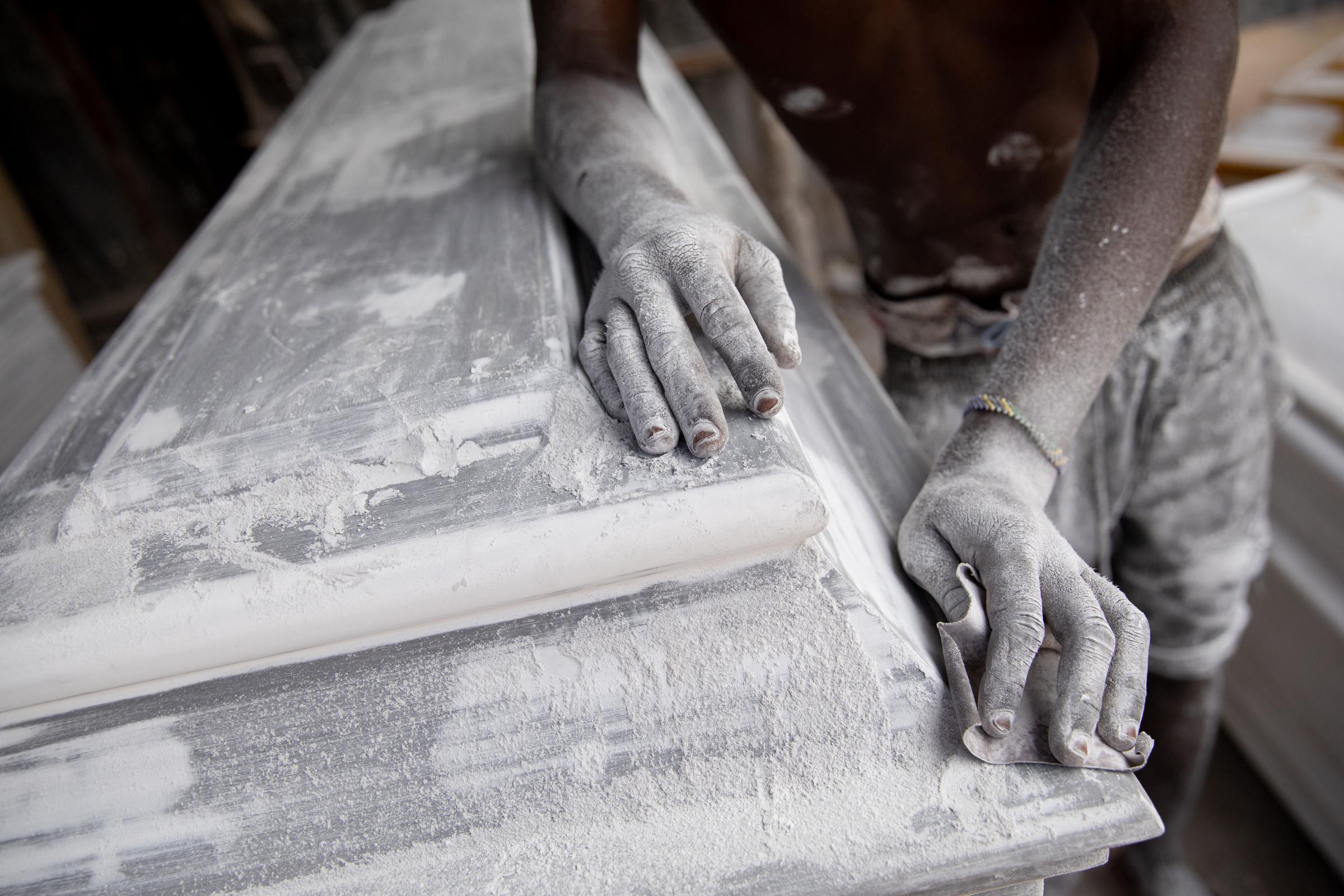
Mohammed Harris sandpapers a coffin before it gets painted in the Manzese district of Dar Es Salaam, Tanzania on 27 October 2021.
The coffin making industry flourishes in this district and business, according to those who work there, has been booming. Despite Covid-19 officially not being reported from April 2020 their business peaked several times between then and now - replicating what was probably the country’s several waves of the pandemic.
Kennedy Morris, who owns one of the coffin shops, explained that in pre-pandemic days he would sell 2-3 coffins a day. In 2020 and 2021 there were times when he sold up to 7 or 8 a day. (They are currently back to 2 or 3 a day)
CREDIT: Samantha Reinders for The Wall Street Journal
SLUG: Tanzania
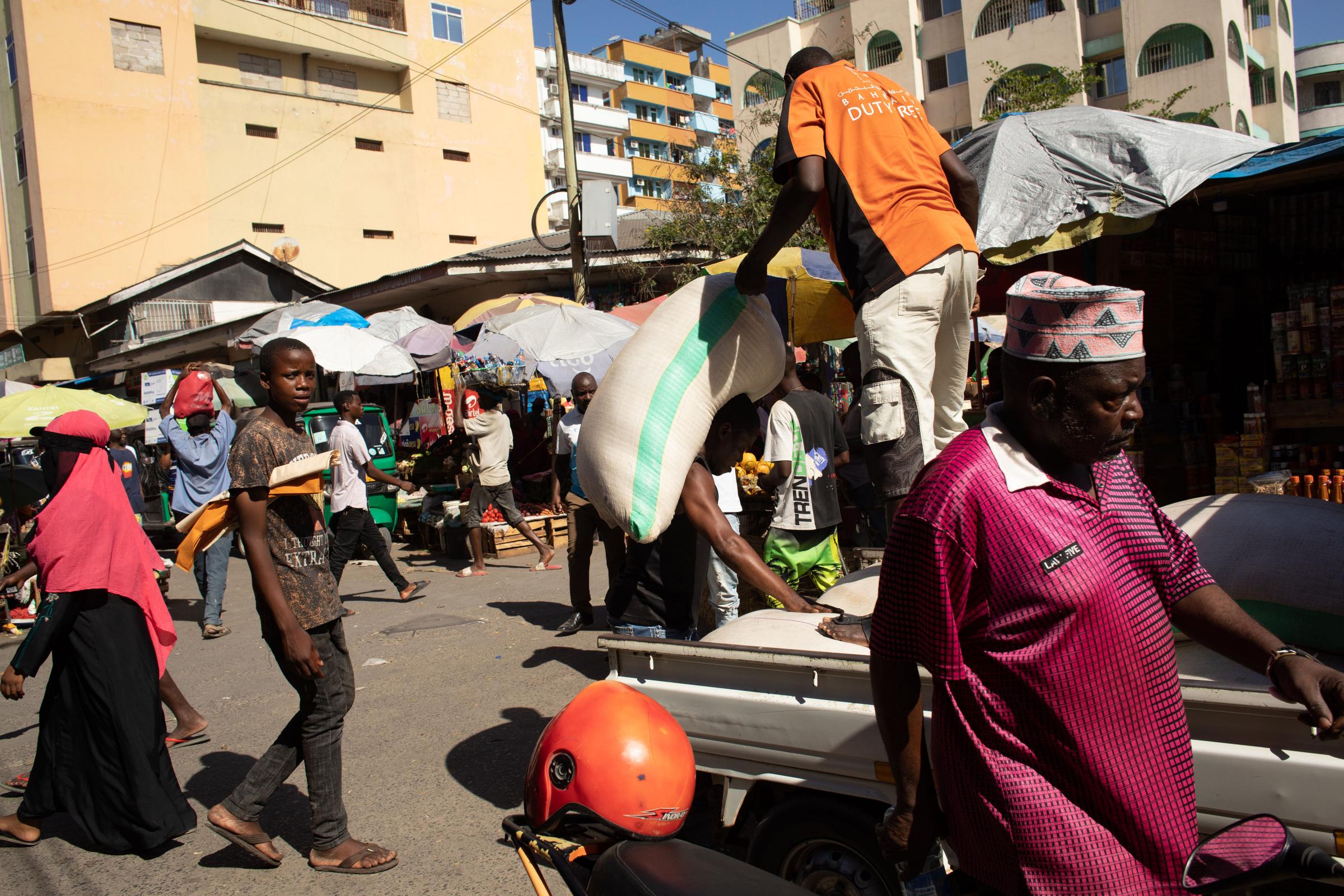
Daily life unfolds in a section of Kariakoo Market on 25 October 2021.
The market - whose existence dates back to the colonial days - is found in the heart of Dar es Salaam and serves millions of people in East and Central Africa on a daily basis. It is a constant hustle and bustle.
Covid has changed little for this market - social distancing here is not possible and masks are not worn.
CREDIT: Samantha Reinders for The Wall Street Journal
SLUG: Tanzania
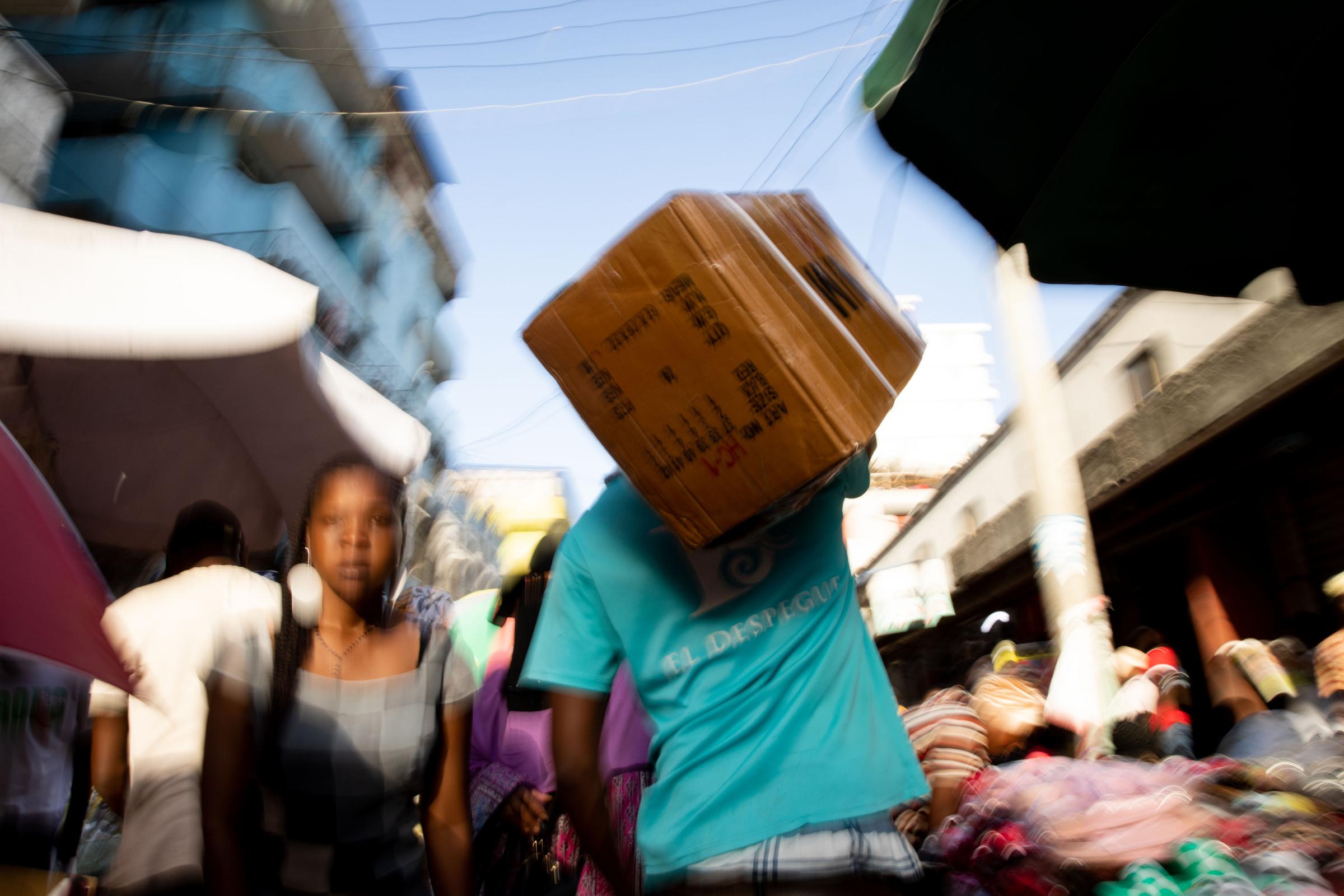
Kariakoo Market in central Dar es Salaam, Tanzania on 28 October 2001.
Crowds of traders, food vendors, and visitors buy, sell, gossip, eat, laugh, pickpocket, bargain and hang out in huge numbers without a mask in sight. Kariakoo is the nerve centre of all manner of commerce in Dar es Salaam.
The main market building whose existence dates back to the colonial days was gutted by fire in mid-2021. Despite this vending continues unabated attracting more people than ever.
CREDIT: Samantha Reinders for The Wall Street Journal
SLUG: Tanzania
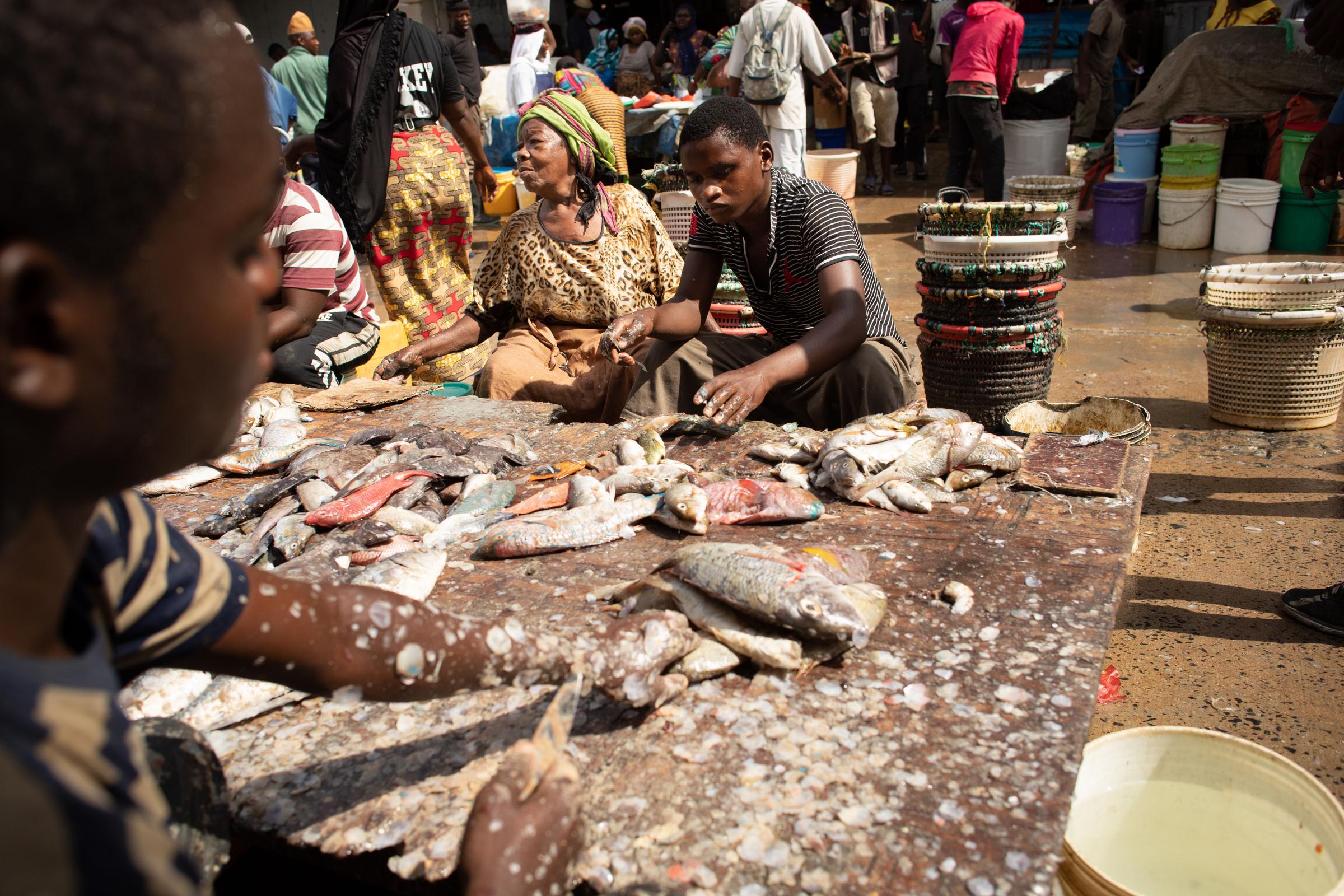
Daily life continues at Dar es Salaam’s Mzizima Fish Market, in Tanzania, on 28 October 2021.
Despite heaving crowds no one is masked. Social distancing is impossible.
Those I spoke to say the pandemic changed almost nothing here on daily basis. “We catch fish, we sell fish, we have to if we want to eat, Covid or no Covid,” said Deus (no last name), a fisherman who has worked at the market for the last 15 years.
CREDIT: Samantha Reinders for The Wall Street Journal
SLUG: Tanzania
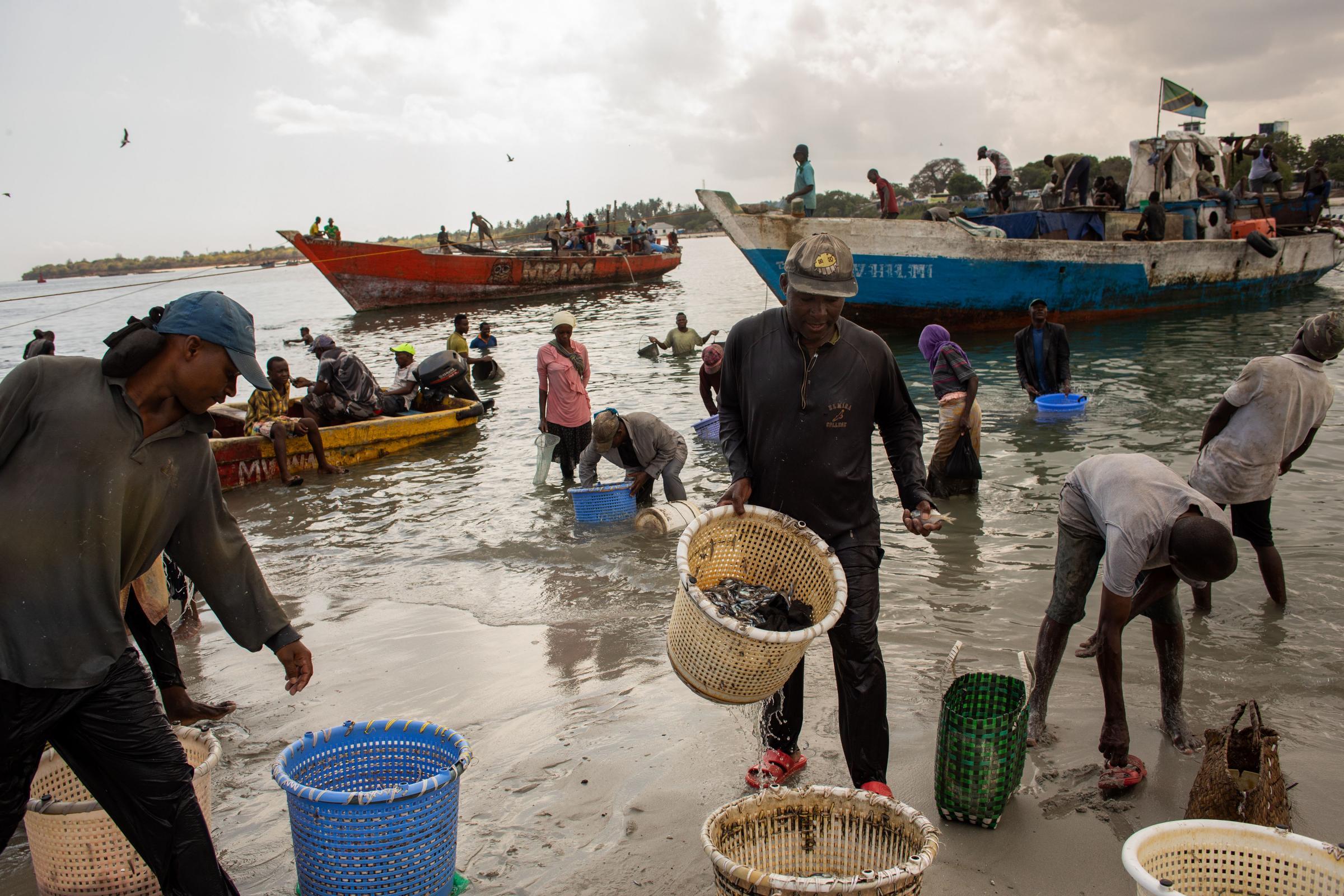
Daily life continues at Dar es Salaam
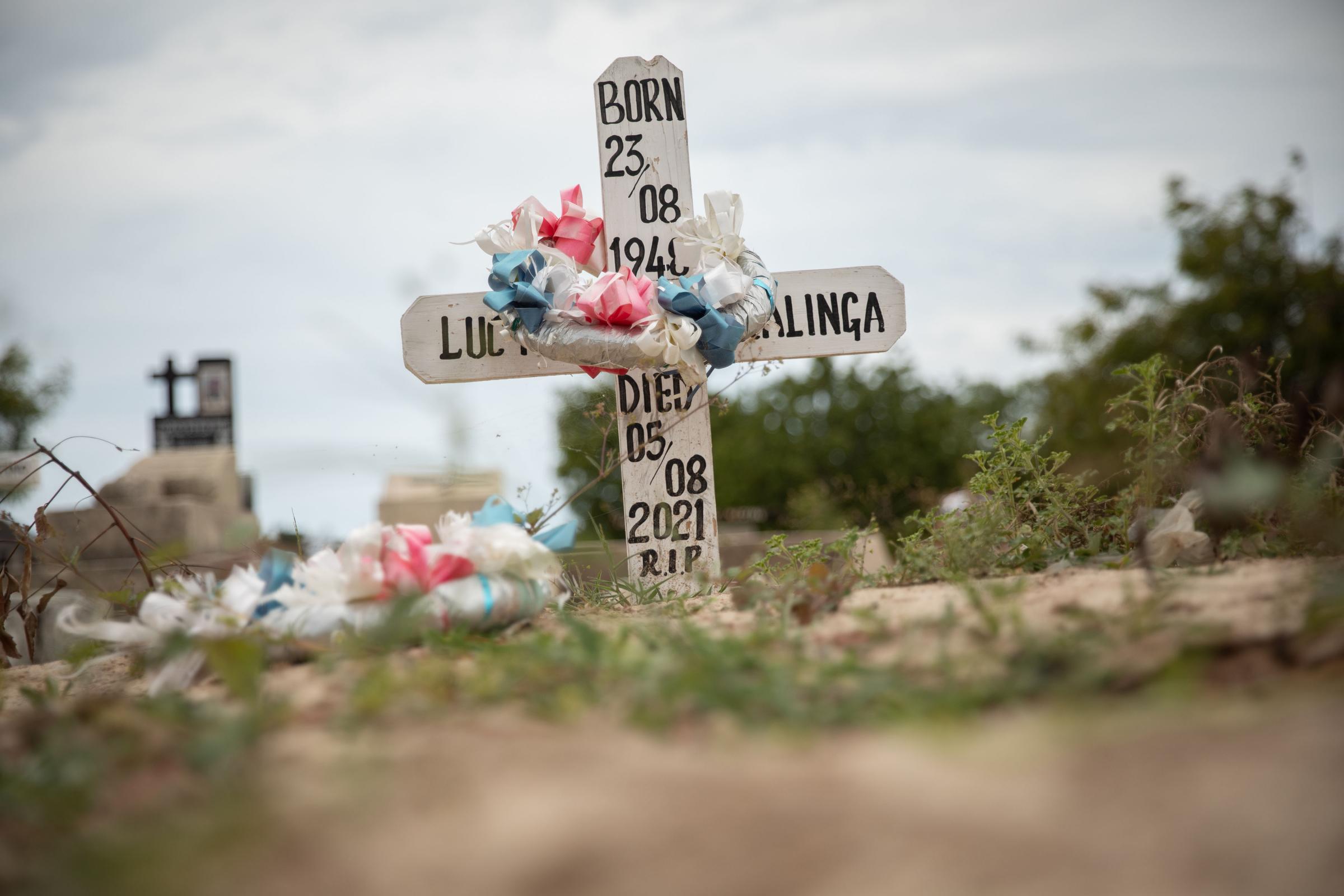
Newly dug graves in the Bungu ward of Dar es Salaam, Tanzania on 26 October 2021.
Videos of night burials were circulated on social media in Tanzania causing some to call into question the government's approach to the coronavirus pandemic.
The footage shows funerals taking place under tight security with people wearing personal protective equipment and very few mourners in attendance.
Opposition politicians and activists believe it may be part of cover-up by the authorities who have not been releasing regular updates on coronavirus.
Unlike other countries, Tanzania has not opted for strict lockdown measures although mass gatherings at funerals, like weddings, have been banned.
CREDIT: Samantha Reinders for The Wall Street Journal
SLUG: Tanzania
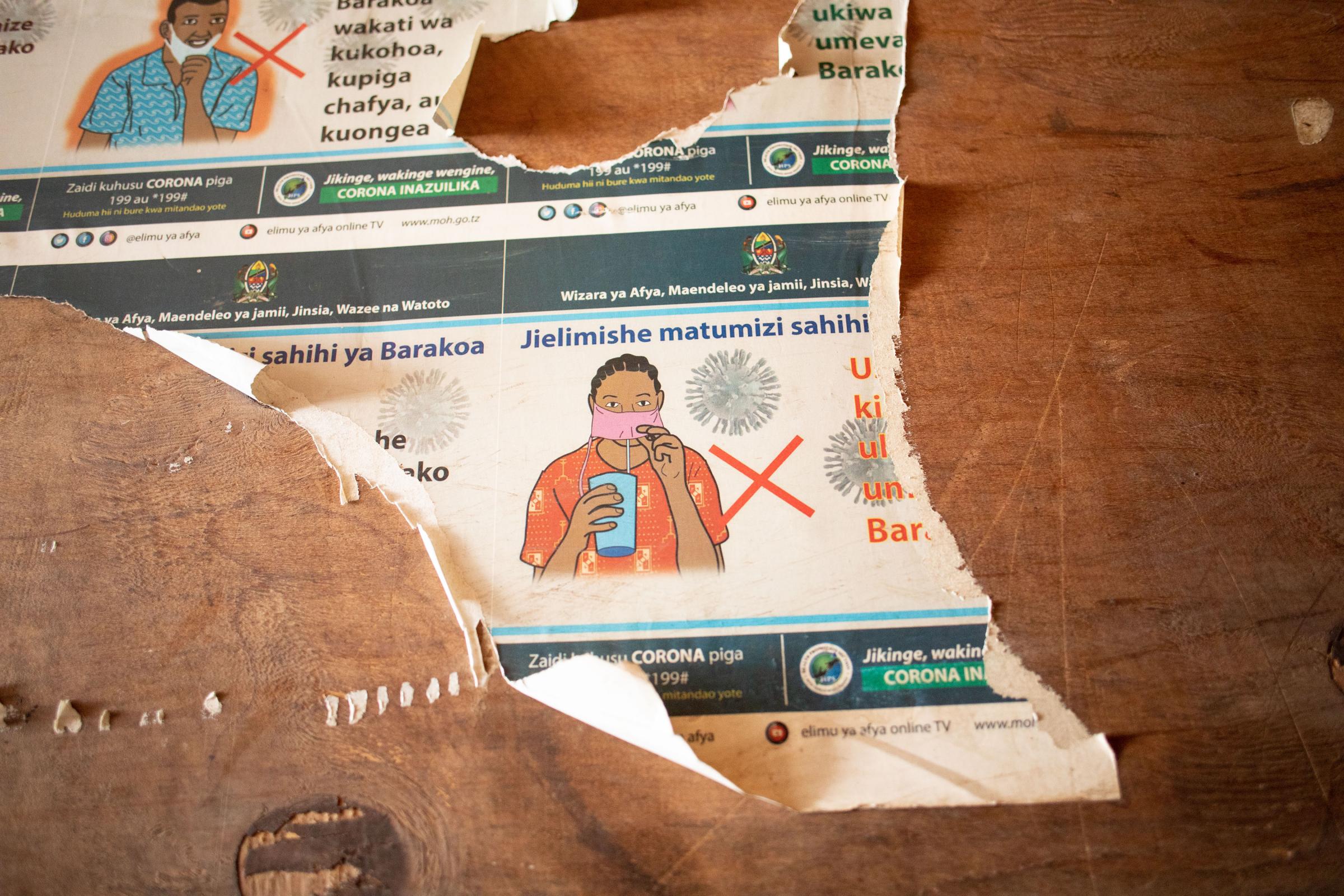
Torn educational Covid-19 posters in a section of Kariakoo Market on 25 October 2021.
The market - whose existence dates back to the colonial days - is found in the heart of Dar es Salaam and serves millions of people in East and Central Africa on a daily basis. It is a constant hustle and bustle.
Covid has changed little for this market - social distancing here is not possible and masks are not worn.
CREDIT: Samantha Reinders for The Wall Street Journal
SLUG: Tanzania
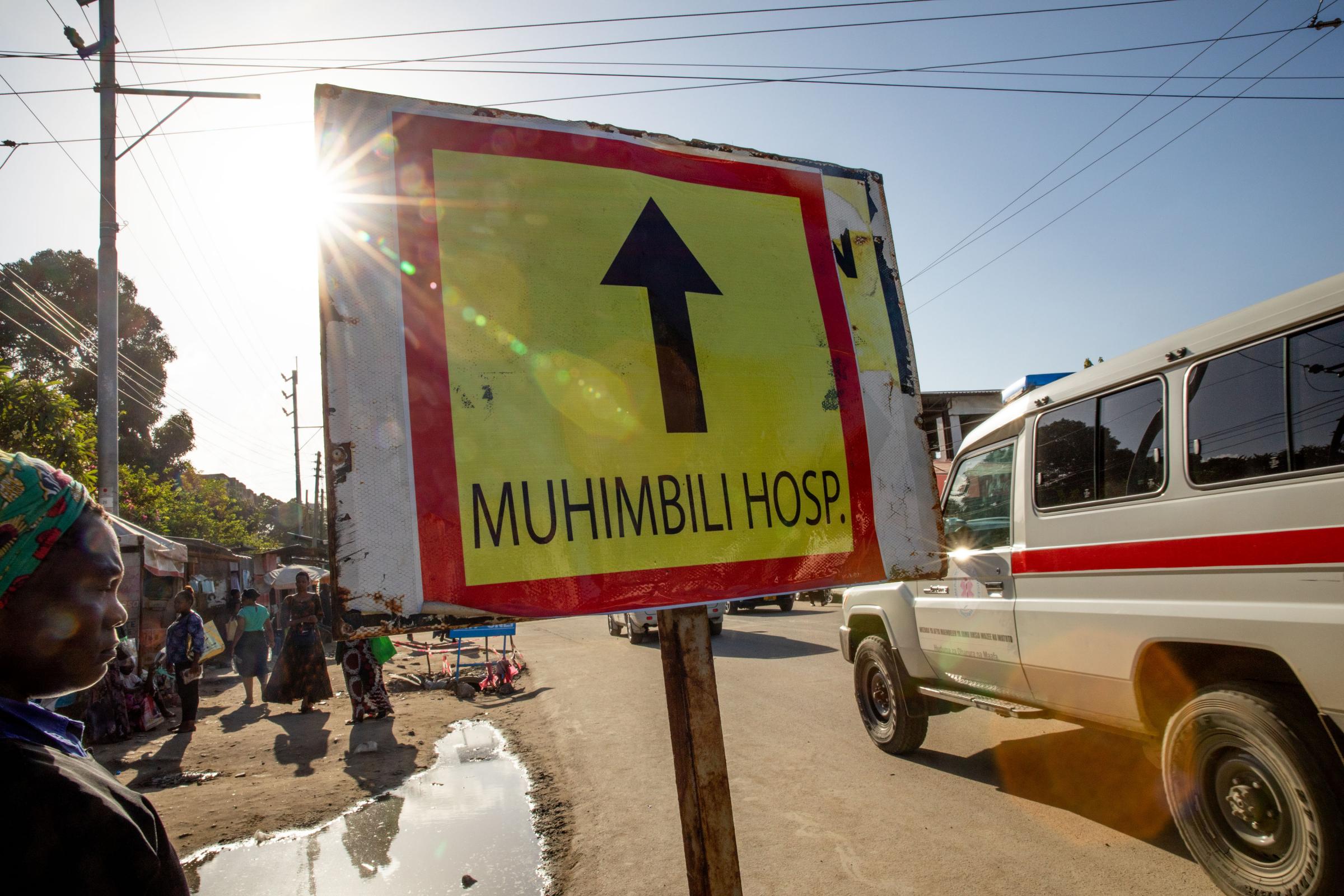
Muhimbili National Hospital in central Dar es Salaam, Tanzania on 27 October 2021.
Muhimbili National Hospital (MNH) is a National Referral Hospital, Research Center and University teaching Hospital with 1500 bed capacity and attending 2000 outpatients per day.
It has 2800 employees which includes doctors, nurses, pharmacists and other supporting staff.
CREDIT: Samantha Reinders for The Wall Street Journal
SLUG: Tanzania
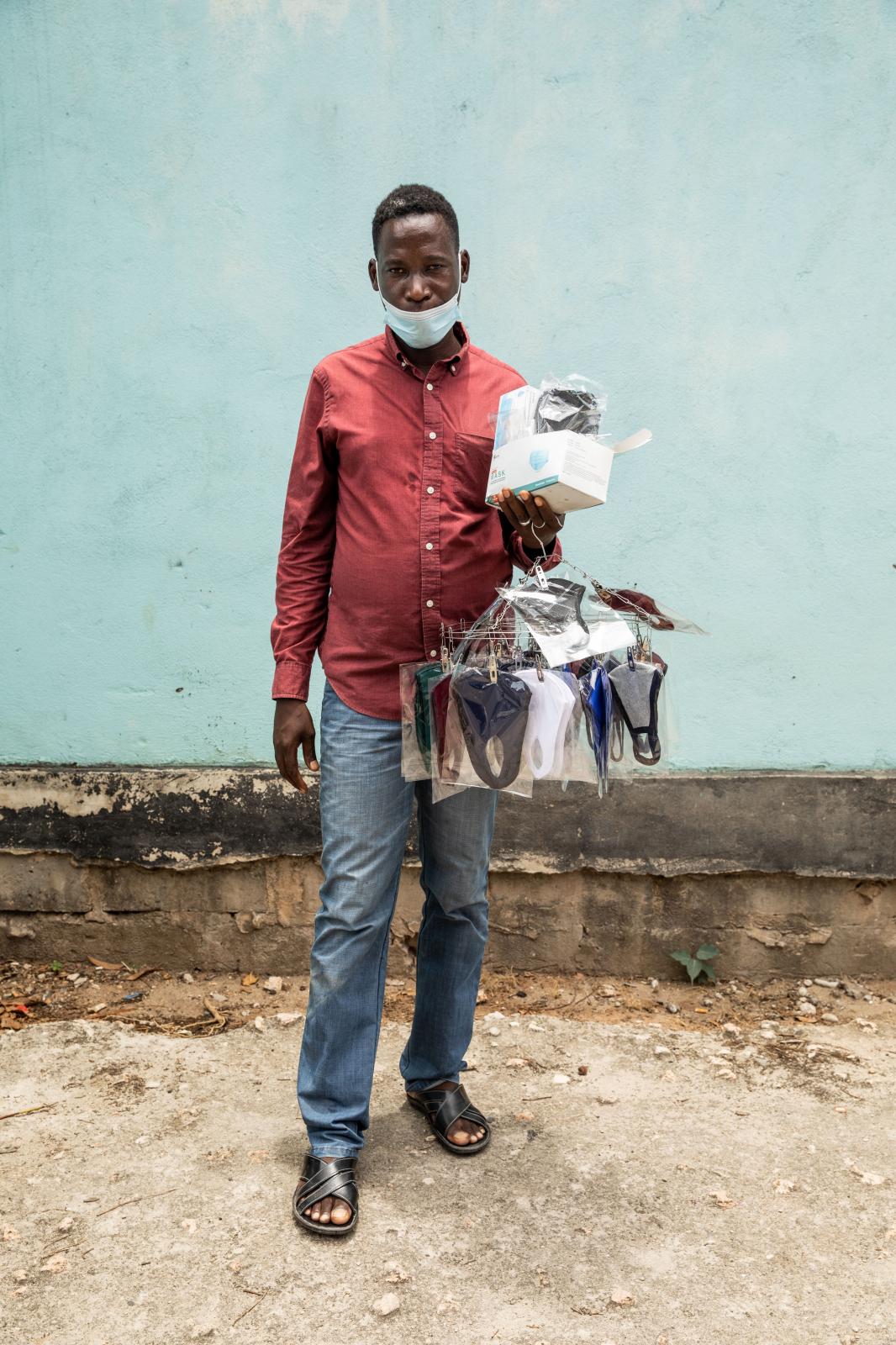
Ibrahim Danielle sells masks outside Regency Medical Center, a private hospital, in central Dar es Salaam, Tanzania on 26 October 2021.
One of the few places to buy a mask in the city is outside it’s hospitals, because hospitals are the one place that you are required (officially) to wear one. As a result handful’s of young men hustle outside the doors of each one with different varieties on offer - cheap medical masks to ones adorned with Gucci or Nike symbols. You can buy one for 500 Tanzanian shillings ($0.25).
Danielle makes roughly Ts30000 a day ($13) a day selling masks. Pre-pandemic he was a tailor and says he makes much more money doing this.
The hostility to COVID-19 jabs and suspicion of science are fueled by a legion of rebel politicians and radical clerics who are opposed to the vaccination idea based on religious convictions.
As vaccines become widely available, a huge number of Tanzanians are still undecided about getting vaccinated because of a complex web of moral, medical and political convictions.
CREDIT: Samantha Reinders for The Wall Street Journal
SLUG: Tanzania
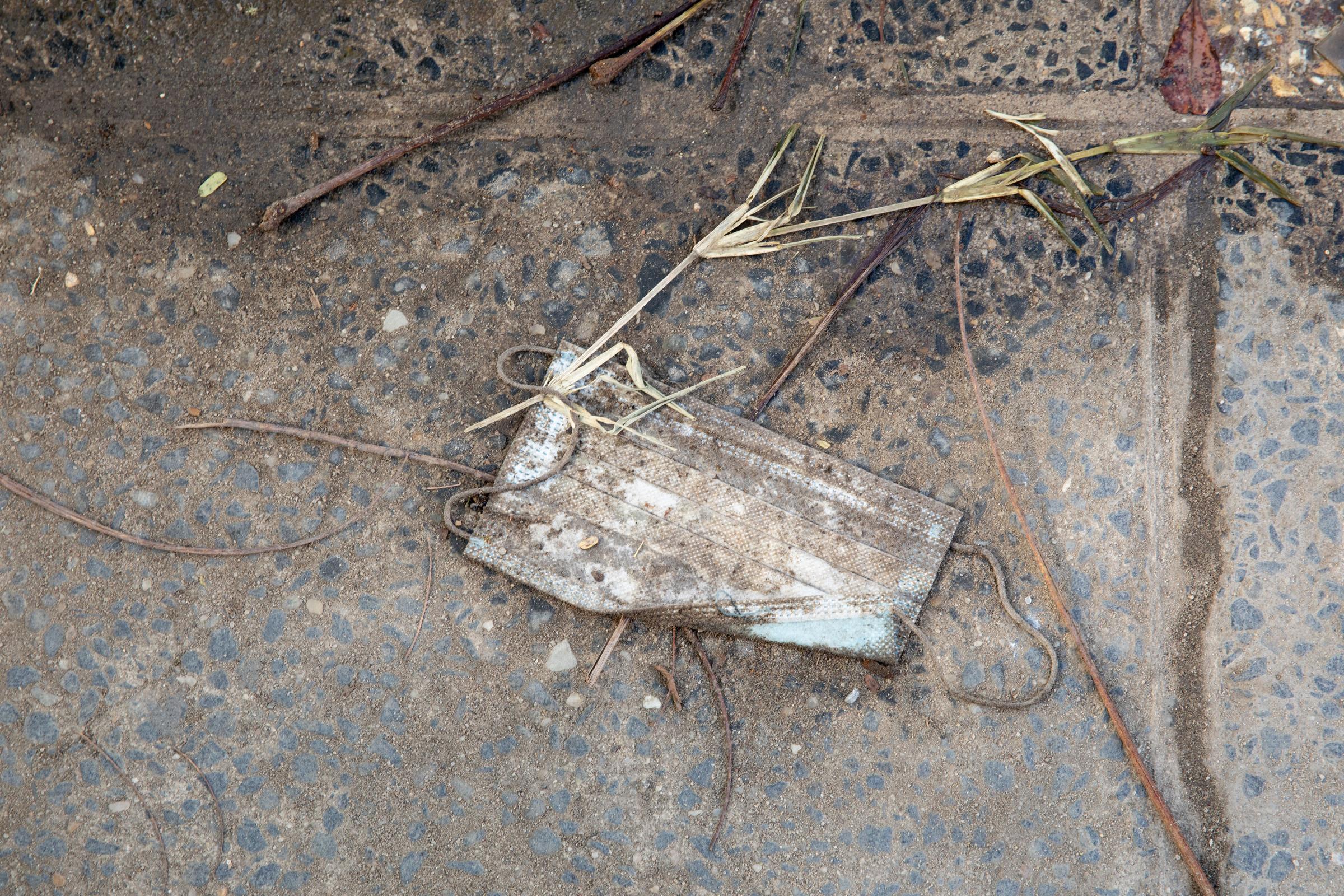
Muhimbili National Hospital in central Dar es Salaam, Tanzania on 27 October 2021.
Muhimbili National Hospital (MNH) is a National Referral Hospital, Research Center and University teaching Hospital with 1500 bed capacity and attending 2000 outpatients per day.
It has 2800 employees which includes doctors, nurses, pharmacists and other supporting staff.
CREDIT: Samantha Reinders for The Wall Street Journal
SLUG: Tanzania






















